Using sales automation tools lets you step back from a lot of the tasks that can otherwise take up a hefty chunk of your time. CRMs are now the most basic of technologies at the disposal of sales teams, but automation is about more than just CRMs. Prospecting, pipelines, lead enrichment, communications, and forecasting are all areas where new automation tools can help you close deals with more speed, ease, and frequency than ever before. Wondering what you can automate, and how? Here’s your guide to the most modern types of sales support technologies.
What is a sales automation tool?
Sales automation is software used to help you perform tedious tasks faster and more efficiently, providing data and insights to make decisions quickly.
There are automation tools for every step of the sales process: sales prospecting lists, qualifying leads, email marketing, nurturing, sales presentations and demos, and closing the deal. Some sales automation software is designed to be all-in-one, tackling all those aspects, while other tools zoom in on a single issue, like finding a verified email address or phone number within seconds.
Choosing one, or even a suite, of these tools depends on what kind of tech stack you currently have and the gaps that are really affecting your performance. It would be great if there was just one platform that could handle everything. But, as you might have seen in our survey on sales intelligence tools, sourcing a quality platform that does it all is tough. Instead, many sales professionals mix and match different tools to meet their needs. To help you find your best setup, we’ve laid out the best choices below.
Why is sales automation important?
Sales automation systems are an essential part of inside sales. Sales reps contact, sell, market, monitor, and nurture hundreds of potential leads or customers, and they need support to speed up these processes. This way they can save time for the most important task—closing the deal.
Closing the deal requires building a special relationship, watching prospects closely, and waiting for the right signal to ask for the sale. This is difficult to do when your day is crammed with work. Sales automation platforms minimize time wasted on tasks that aren’t directly connected to finalizing a deal.
Sales automation vs. CRM
Sales automation does not equal CRM. You could say that a CRM in a sales organization is the first stage of the automation journey. Some CRMs can do more than the basics – they might include automated prospecting and list-building capabilities, integration with phone systems, and more. If you have these prospecting tools as part of your CRM, you’re lucky and should start leveraging them.
But it’s likely that your CRM will not address automation for all your sales tasks. So in this post, we’ll focus on additional tools beyond the CRM that can automate specific sales activities.
What can you automate?
While this is not a comprehensive list, here are several core sales activities that are well-covered by automation tools:
- Prospecting – making it easier to build lists of relevant prospects. The better and faster you can do this, the more high-quality opportunities you will have further down your pipeline. Arm your SDRs with machine helpers.
- Lead enrichment – obtaining rich data on prospects, such as contact information, organization hierarchy, and sales intelligence. This can save time and increase the number of opportunities – and give you more, better contact details.
- Sales pipeline management – digital systems that can help you push sales teams to new levels by providing process management, sales analytics, and powerful feedback to sales reps.
- Scheduling – a core activity of sales is scheduling meetings, and luckily it’s easy to automate. There are tools that can turn this process into one click, improving rep productivity and making your team more available and responsive to customer calls.
- Emails and sales calls – relying on sales reps to manually send email follow-ups, and dial to prospects relying on their memory is a thing of the past. Modern tools will tell reps exactly when they need to follow up, send emails automatically, and supply data and templates to make communication more effective.
- Forecasting – entire organizations( as well as their sales teams) want to know what to expect in terms of upcoming revenue and the resources needed to generate it. Through report generation, analytics, goal tracking, and predictive modeling, sales automation tools provide valuable planning information.
Sales Prospecting Automation Tools
These are tools that can automatically produce lists of leads and help you make contact with them based on initial criteria that your sales reps provide. Automated prospecting can save time for SDR reps and improve lead quantity and quality.
1. LinkedIn Sales Navigator
LinkedIn Sales Navigator is a LinkedIn product that automates sales prospecting by sifting through leads on LinkedIn and identifying relevant prospects. It provides the Lead Builder, an advanced search box that lets you filter LinkedIn users by company, job title, industry, seniority, years of experience, location, and more. This can help SDRs hone in on prospects very quickly and prioritize where to invest research and calls. LinkedIn’s CRM integration allows you to pull lead data directly into tools like Salesforce and Microsoft Dynamics 365.
LinkedIn Sales Navigator pricing: 30-day trial, paid plans start at $79.99 / month including 50 InMail messages and 10,000 saved leads.
2. LeadFuze
LeadFuze is an AI-powered lead researcher that automates list building. You can set criteria like job function or title, industry, and location, and receive double-verified email addresses, company, domain, job title, and social media profiles. Data is taken from several third-party providers as well as LeadFuze’s own database. The platform also enables email automation and assists with personalizing follow-ups.
LeadFuze pricing: Paid plans start at $147 / month. Lead-based pricing is also available.
3. Datanyze
Datanyze analyzes a company or website, and discovers which technologies they are using. It can also provide other attributes like company size, revenue, industry, etc., as well as contact details of employees. Datanyze supplies a convenient Chrome extension that gives you all this data instantly as you surf the web. In addition, the company delivers “icebreakers,” which are bits of information that are relevant to prospects and used by a salesperson to easily begin a conversation.
Datanyze pricing: The free plan offers 10 contact information lookups per month. Paid plans start from $21 / month.
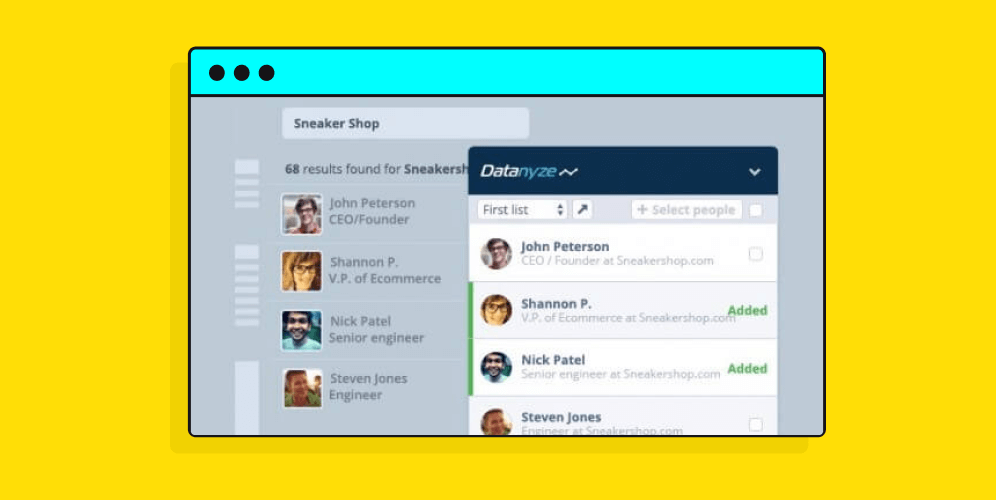
Lead Enrichment Automation
Sales automation tools put your sales team at a much better starting point without having to invest any time in research. They provide emails, direct dial numbers, and other rich data about prospects and the companies they work for.
4. Lusha
The sales funnel can’t operate without contact details like emails and direct dial phone numbers. Our very own tool can help. Lusha operates a database of hundreds of millions of business profiles and can enrich lead data with emails and direct dial phone numbers. Lusha finds accurate contact details for contacts in most industries, making it a powerful SDR tool – because often good prospects are put to the side as there’s no easy way to contact them.
In addition to contact details, Lusha provides additional information that can help you decide if a prospect is a good fit, like buying signals (intent data), job change alerts, funding data, and insights into a prospect company’s tech stack.
And to keep things easy, Lusha provides a Chrome Extension to get you started in literally one minute. It also supplies a contact API and Salesforce CRM integration for larger-scale use.
Lusha pricing: The free plan includes 5 emails and mobile phone numbers per month. Paid plans start at $29 per month for 480 credits.
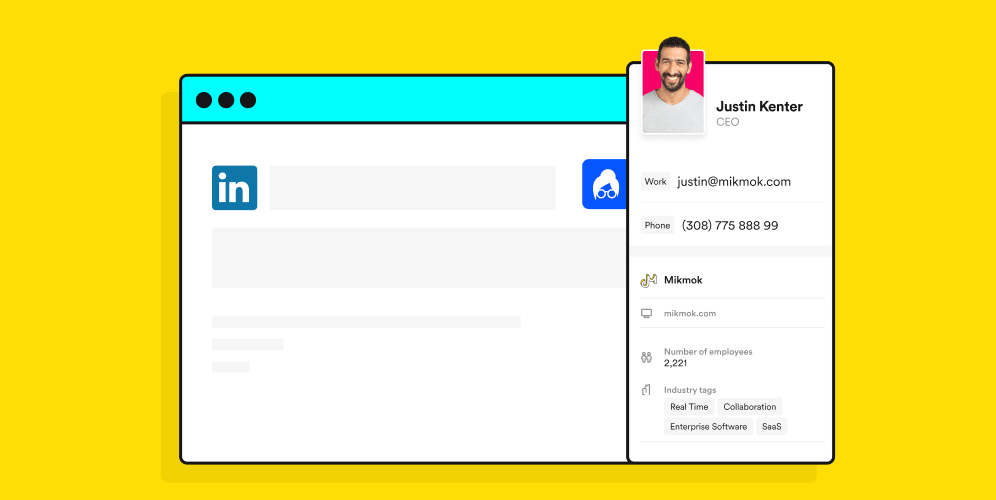
5. ZoomInfo
ZoomInfo is a sales intelligence platform that supplies detailed information about prospects and the organizations they work in. Through their acquisition of Discover Org and their own dataset, ZoomInfo can provide organizational charts, direct dial numbers, buying triggers (such as a leadership move, an acquisition, or a vendor switch), technology used by the company, and more. The platform integrates with all the popular tools in today’s marketing stack including HubSpot, Marketo, Eloqua, Salesforce Pardot, and SugarCRM.
ZoomInfo pricing: Pricing on request.
6. Discover.ly
Your prospects use multiple social networks, and on each network, they share information that might help you close a sale. Discover.ly is a browser extension that lets you look up your existing contacts in Gmail, Twitter, or LinkedIn and see what those contacts are doing there as well as on AngelList and Crunchbase.
Discover.ly pricing: Pricing on request.
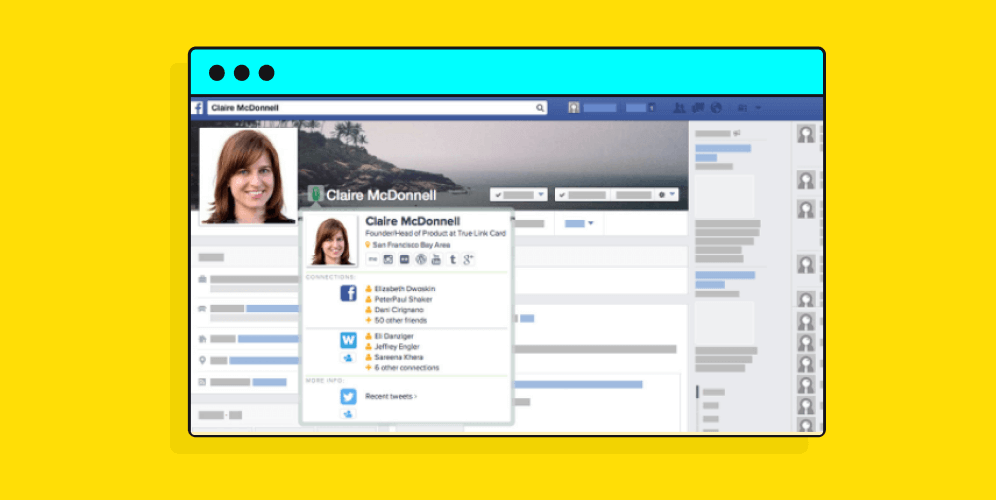
Sales Pipeline Management Tools
These are tools that can take sales teams to the next level, with sales funnel management and actionable data that help reps close more deals.
7. LevelEleven
LevelEleven is a sales management platform. It gives sales leaders the tools to motivate, engage, and coach sales teams. The platform provides real-time dashboards, sales contests, achievement alerts, personalized scoreboards for reps, goal management, and an early warning system for reps who fall behind. It can also help sales managers and veteran reps to coach newer members of the team. Through a snapshot of the coached rep’s KPIs, LevelEleven enables focused advising on specific areas to see how they improve.
LevelEleven pricing: Free demo provided; basic plan starts at $40 per user per month.
8. InsideSales
InsideSales’ Predictive Playbooks AI engine helps teams to identify, prioritize, and connect with prospects using personalized sales engagement plans for calling, emailing, and more. It also delivers integration for your phone and email, so that sales teams not only see the tasks (“call John”) but can actually do them within the tool (click a button to call John). In addition, the company supplies solutions for team management such as reporting and scoring modules.
InsideSales pricing: Upon request.
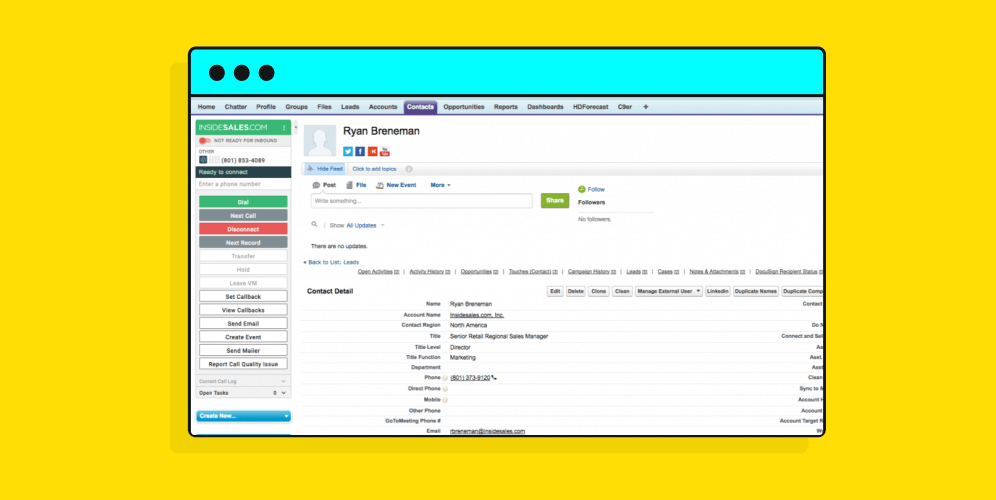
9. SalesLoft
SalesLoft leverages AI for various sales needs such as forecasting, management, tracking, and training. For pipelines, SalesLoft applications include lead generation, automated outreach, and CRM integration. SalesLoft’s platform promises to enable clients with an analysis function that helps to predict pipeline movement, thereby increasing revenues and reducing costs.
SalesLoft pricing: Upon request.
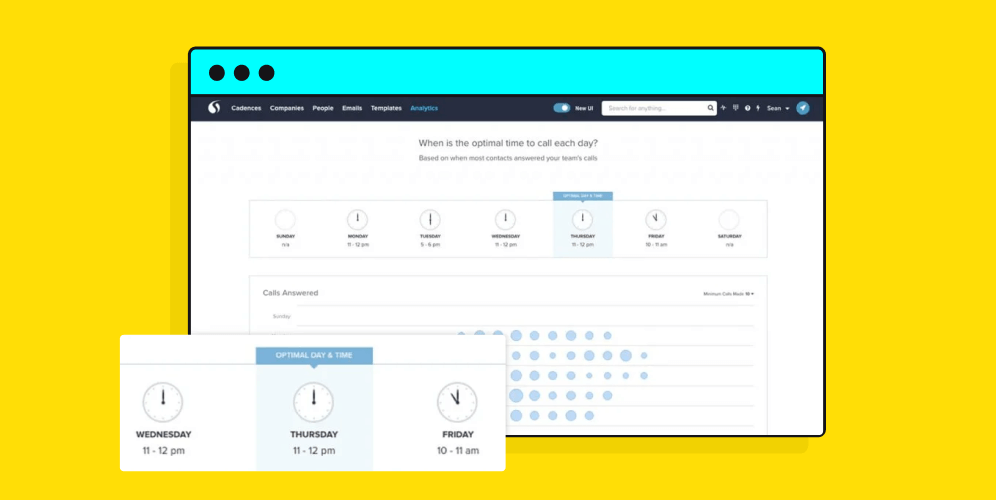
Scheduling Automation Tools
Sales automation tools that make scheduling meetings and calls a one-click activity.
10. Calendly
Calendly performs automated meeting scheduling while avoiding the back-and-forth of multiple emails needed to find a time and place. You can connect Calendly to the calendar of an SDR or sales rep, and send a link to anyone interested in a call. They can click the link to see open slots on the calendar and schedule a meeting themselves.
Calendly allows you to create different meeting types for different types of prospects: for example, 15-minute meetings, 30-minute meetings, meetings that can occur only on mornings or specific days, etc. Another interesting feature is round-robin calendar sharing, where new requested meetings are rotated between a team of sales reps.
Calendly pricing: Free with limited features; paid plans start at $10 per user per month.
11. Cirrus Insight
Cirrusinsight.com is another popular meeting scheduler that works a bit differently from Calendly. With Cirrus Insight, sales reps can schedule meetings by selecting several open slots on their calendar. An email is automatically composed which shows the prospect the available slots, lets them select one, and then schedules a meeting if the rep is still available. Cirrus Insight also supplies an automated system for checking when a prospect engages with your email, web links, and web pages.
Cirrus Insight pricing: Three-month limited function free trial; paid plans start at $10 per user per month.
Sales Emails and Calls Automation
These are sales automation tools that help reps communicate with sales prospects quickly and effectively, with less administrative overhead.
12. Outreach.io
Outreach is an all-in-one sales automation platform that provides automated sales sequences, a sales dialer, sales emails and tracking, and automated meeting scheduling. Outreach provides sales teams with a clear “rep workflow” containing predefined steps that lead to closing a sale. Execution of the different steps can be performed within the platform, which provides integrated templated emails and telephony.
Outreach.io pricing: Enterprise pricing on request.

13. YesWare
YesWare promises sales teams “a follow-up strategy that just works”. It provides email scheduling, automated meeting scheduling, and email tracking. YesWare is built around touchpoints that define steps in the sales cycle and help you craft automated drip campaigns, interlaced with personal emails and phone calls. The company also supplies a data enrichment service for lead generation and contact enrichment.
YesWare pricing: Free version with limited features; paid plans start at $15 /user /month for basic features.
14. TenFold
TenFold captures incoming and outgoing calls to and from your sales team and ensures the rep has all the relevant information on a prospect right in front of them during the call. It allows reps to make notes and add information about prospects directly in its UI, which integrates with all common CRM systems. It also captures all communications with sales prospects and provides powerful call analytics.
TenFold pricing: Free trial available upon sign-up, pricing on request.
Forecasting Automation
Predicting deal closures, revenue, and individual performance is essential for planning, goal-setting, strategy, and incentive programs.
15. Gong.io
Gong is a revenue intelligence platform that gathers and analyzes data from various sales team interactions with prospects and customers. By using AI, Gong.io forecasts factors such as revenue, deal-closing potential, and the performance of individual team members. Gong.io’s technology enables you to identify valuable opportunities, coach underperforming reps, predict sales, and plan ahead.
Gong.io pricing: Upon request.
16. People.ai
Through artificial intelligence, People.ai helps sales, marketing, and customer success teams identify revenue opportunities. It gives them a complete picture of sales activities by leveraging AI as a way to administer analytics, coaching, feedback, and pipeline overviews. For the sales team, People.ai identifies decision makers, tracks sales engagement with those people, and analyzes the success levels of various campaigns. With this information, teams can construct more personas and models.
People.ai pricing: Upon request.
17. Clari
Clari uses AI to analyze data captured across an organization through systems like marketing automation, CRM, email, calendars, and phone conversations. Their AI capability allows sales teams to apply predictive modeling and forecast revenue, sales opportunities, and risks. Clari eliminates the need for guesswork in making essential sales and revenue decisions.
Clari pricing: Upon request.
18. Aviso
Aviso is an AI-powered solution that enables sales teams to close more deals. It has four modules that analyze sales processes to understand their strengths and weaknesses. In particular, Aviso’s Sales Vision module helps sales executives and CFOs forecast revenue by focusing on high-potential deals. To this end, Aviso uses historical and real-time data from applications such as CRMs to deliver more analytic power.
Aviso pricing: Upon request.
How to choose the best sales automation tool
Lots of tools means lots of choices. The most important step for picking a sales automation tool is to make sure that you need it. According to Zylo, about 50% of SaaS licenses go unused. This happens because apps are often more complicated to use than at first thought, and because the gap that they fill isn’t something that troubles an employee on a regular basis. Put together, these factors mean that employees don’t want to spend time solving an issue that they don’t really worry about. It’s up to purchasing and sales managers to buy the right stuff and ensure it gets used.
Besides that, here are some critical things to contemplate before making an addition to your sales and marketing stack:
- Set up – up-front installation fees, paying for an installation specialist, and integration compatibility issues will all boost costs.
- Learning curve – at the very least, basic features should be intuitively useful, while advanced features should be within reach of most of the team.
- Data privacy and security – check that, if you are storing third-party data, the platform meets privacy standards like GDPR, and that it has internal security measures that prevent hacking.
- Upgrades – sales automation technologies are constantly changing, so make sure that your provider meets current standards for issues like scalability and has a regular schedule of updates.
Your next step in sales automation
If there’s one priority for every outbound sales team, it’s working with a list of quality contacts. Some sales automation tools help you schedule, connect with contacts, and forecast productivity. But everything starts with the leads and prospects that need to be found first.
Lead enrichment and prospecting technologies like Lusha are a vital link in this chain. We help you identify the most relevant contacts and discover more about them so that you can build a personalized approach. We also check every box when it comes to set up, ease of use, and data privacy compliance. If you’re interested in sales automation but haven’t boosted your lead gen or prospecting power yet, take a look at Lusha.
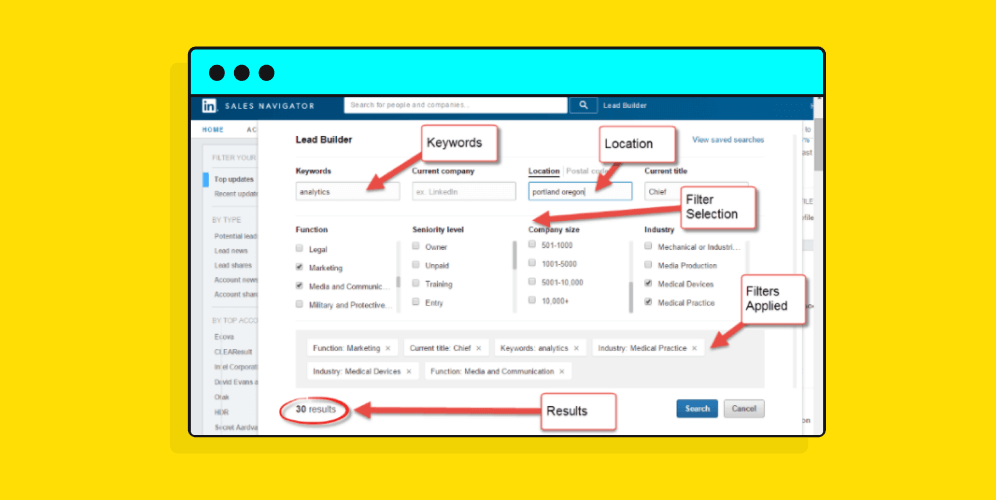 Image Source
Image Source